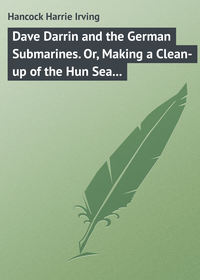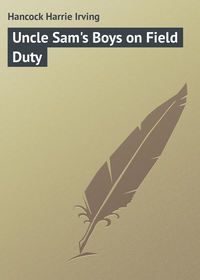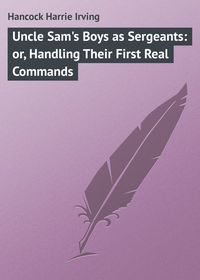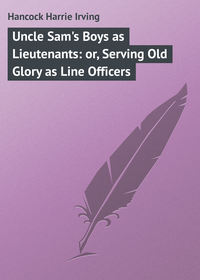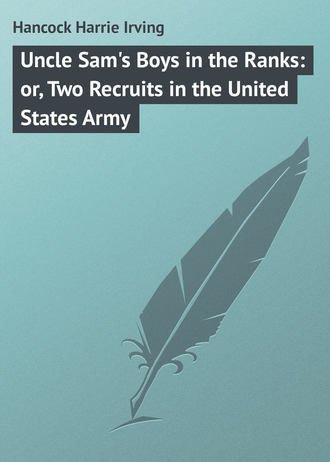 полная версия
полная версияUncle Sam's Boys in the Ranks: or, Two Recruits in the United States Army
"More'n an hour late," answered the trainman.
"Whew! That means we won't get there until after three in the morning," muttered Hal.
"I wish we wouldn't get there until daylight," rejoined Noll. "Then I'd feel like dropping back for another nap."
Nearly everyone else in the car was dozing, it being after midnight.
It was half-past three o'clock in the morning when the brakeman rested his hand on Hal's shoulder.
"We ought to be at Clowdry in five minutes now," said the brakeman.
"Much obliged," Overton answered. "Thank goodness, Noll."
By the time that the train slowed up both recruits were out on the rear platform of the car, each gripping his canvas case.
"Clowdry! Clowdry!" bawled the brakeman.
Hal and Noll dropped off into the black night. The only light was in the station, past which the train slowly rolled.
There was no one in the station save the telegraph operator. On these mountain divisions, where accidents may so easily happen, a night operator is kept at every station.
Hal and Noll stood on the station platform until the train had pulled out. Then, as their eyes became more accustomed to the darkness, they made out what appeared to be a small hotel on the other side of the track. There were two or three other buildings near by that looked like dwellings.
"Clowdry is a pretty large city," observed Noll, with a grin.
The real town was nearly a mile away.
"I wonder where the fort is," returned Hal. "We'll ask the operator."
Apparently the operator was too well accustomed to seeing soldiers to take any deep interest in this new pair. But he was obliging, at any rate.
"Wait a minute," he called back, in answer to Private Overton's question, "and I'll go and show you the road."
So the two soldiers stood by their canvas cases until the operator had finished at his clicking instruments. Then the operator came out, heading for the rear door of the station.
"I'll show you from here, Jack," called the operator. "You see that road? Follow it about a half a mile; take the first turn to the left, and then keep straight on until you come to the fort."
"How far is Fort Clowdry?" Hal wanted to know.
"About three miles from here."
"Good road?" questioned Noll.
"Tenderfeet, ain't you?" asked the operator, smiling.
"Yes," admitted Hal.
"Thought you must be," nodded the operator, "else you'd know that the road between an Army post and the nearest freight station is always a good one. Them Army wagon bosses would put up a fearful holler if they had to drive the transport wagons over bad roads. Just joining?"
"Yes," assented Hal.
"Good luck to you! Well, follow the road and you can't have any trouble."
"Thank you, and good-night," came from both recruits. Then, each taking a new grip on his canvas case, which was fairly heavy, the recruits started down the road.
They came, finally, to the turn to the left.
"These equipment cases don't grow any lighter with distance, do they?" laughed Hal.
"Mine doesn't," grunted Noll.
When they had walked on a good deal farther Noll remarked:
"I wish we had that operator here!"
"What for?"
"He told us it was three miles. We could ask him what kind of miles."
"There's daylight coming," nodded Hal, pointing to the east. "That will make the distance seem shorter."
The sun up, at last, gave the recruits their first glimpse of their first station in the Army. Fort Clowdry lay before them. There were no frowning parapets, no stone battlements, no cannon in sight. Fort Clowdry, as seen at the distance, consisted of a great number of buildings, of all sizes.
Boom! went a gun suddenly.
"Great!" cried Hal, his eyes shining. "That's the essence of the soldier's life – the sunrise gun. The Flag has just been hauled up."
In the middle distance the recruits caught sight of a soldier pacing, his gun, with bayonet fixed, at shoulder arms.
"That sentry will put us on the rest of our way," predicted Noll.
It being now broad daylight the sentry did not challenge the newcomers.
CHAPTER XIII
"TWO NEW GENERALS AMONG US"
"SENTRY, we're recruit privates, joining the regiment at this station," announced Hal. "Where do we report?"
Bringing his rifle to port arms the soldier replied: "This is post number seven. You'll find post number one at that building under the fir-tree. That's the guard-house. Report, first, to the corporal of the guard."
"Thank you, Sentry."
"Welcome."
Bringing his piece to shoulder arms, the sentry resumed his pacing.
Hal and Noll now followed a well-kept road to the guard-house. Outside stood the corporal of the guard for this relief. As he gazed at the young soldiers, noting their canvas cases, he did not need to be told that they were recruits. None but recruits have cases the pattern they were carrying.
"Corporal," reported Hal, "we are Privates Overton and Terry, under orders to join the Thirty-fourth."
"Take seats inside, then," said the corporal. "Go to sleep in your chairs, if you want to."
Several other privates, belonging to the guard, were dozing in chairs. But Hal and Noll felt now too wide awake to think of dozing. They longed to step outside for a better look at this post, which was to be their future home. Yet, having been directed to remain inside, they obeyed.
It was a long while afterward before a bugler blew the first call to reveille, which is the "Army alarm clock," the signal to rise.
"Attention!" called the corporal, a few minutes afterward.
All the dozers sprang to their feet, standing at attention.
The officer of the day entered, looking over the men.
Then his glance fell upon the recruits.
"You are new men joining?" he asked.
"Yes, sir," Hal and Noll answered, presenting their orders.
"Corporal, when mess call sounds send a private of the guard with these men to put them in D Company's mess for their first meal."
"Very good, sir."
"Overton and Terry, you will report at the adjutant's office promptly at nine o'clock."
"Very good, sir."
The officer remained to glance over the guard report, then went away.
"When does that mess call sound, Corporal?" asked Hal.
"Five minutes more. Bates, you'll take the recruits to D Company's mess."
Nor did either recruit feel sorry when he was ushered into the enlisted men's mess, near barracks.
"Attention!" roared one waggish soldier.
As by instinct the men in the room stood at attention.
"Two new young generals are honoring us this morning," grinned the wag.
"Throw him out!" growled a sergeant. "It's bad enough to be a rookie without having it rubbed in."
The first sergeant now gave the seating order, and the men fell in at table. The wag sat at Noll's left.
"I find I'm mistaken," called the wag, down the table. "Our guests are only colonels."
"You'll be a general, one of these days, if you don't look out, Fowler," warned another soldier near by.
"The gypsies always told my mother I'd be a general," replied Fowler complacently.
"Yes, a general prisoner," continued the soldier who had just warned the wag.
This raised a prompt laugh, for, in the Army, a "general prisoner" is one who is serving a term of confinement after sentence by a general court-martial.
"There are generals, and generals, of course," admitted Fowler.
"There'd be a general famine, Fowler, if you ever stopped talking at mess long enough to do all the eating that your mouth calls for."
"How long have you young gentlemen been out of West Point?" asked Fowler, turning to Noll.
Noll grinned, but did not make any answer to this question.
"I hope you are West Pointers," continued the company wag. "Nearly all of the gentlemen present are West Pointers."
"Give the rooks time to eat their meal in comfort," ordered a sergeant gruffly. "Have you forgotten the day, Fowler, when you were the greenest rook that the Thirty-fourth ever had?"
"I never was a rook," retorted Fowler.
"You never got beyond being one," retorted a corporal. "Don't mind this chin-bugler, lads. He doesn't know any better."
Hal was paying attention strictly to the meal before him. A good-sized piece of steak and a dish of baked potatoes had come his way, and he enjoyed them keenly. The men of this battalion had a first class commissary officer and lived well.
"You've visiting cards with you, of course?" continued Fowler, after a few moments.
"No," Noll admitted.
"Why, rook, you'll need cards. You've got to call on the K. O. (commanding officer) after breakfast. But we'll fix you out. I'll lend you my pack. The jack of clubs is the one you want to send in to the K. O. Then he'll know 'tis a husky lad that has honored the Thirty-fourth by joining."
"You'll live most of the time at the guard-house, if you take Fowler for your authority on doughboy life," broke in a quiet soldier across the table.
"More likely the happy house would be our address," laughed Hal.
"Doughboy" is the term applied to an infantry soldier. Hal and Noll, being in an infantry regiment, had thereby become doughboys. The "happy house" is the part of a military hospital where mild cases of insanity are confined.
The meal was soon over, and the first sergeant took the trouble to go up to the boys.
"When do you report at the adjutant's office?" he asked.
"At nine o'clock, Sergeant," Hal responded.
"Then, as long as you don't bother anyone else, you can just as well stroll where you please around the post, until nine," continued the sergeant. "Of course you know that nine o'clock means nine to the very minute?"
"We were taught a lot about punctuality at the rendezvous station," Hal answered.
"Punctuality is about the greatest virtue in Army life," nodded the first sergeant of D Company, as he moved away.
In the interval of time at their disposal Hal and Noll were able to see a good deal of Fort Clowdry.
The center of the life there was the great parade ground, a level, grassy plain.
At the north end of this plain stood a row of pretty dwellings. The largest was the residence of Colonel North, commanding officer of the Thirty-fourth. Next to the colonel's residence was that of Major Silsbee, the battalion commander. Past the major's residence was a row of somewhat smaller cottages, each the home of a married officer. The name and rank of each officer was on a doorplate. At the furthest end of the row from Colonel North's dwelling was a building containing quarters for bachelor officers.
On another side of the parade ground were various buildings devoted to the life of the post. There was an Officers' Club, a library, a gymnasium, and at one corner, the post hospital.
Further away from the parade ground were the quarters of enlisted married men, and, beyond that, the barracks of the four companies of the Thirty-fourth stationed at Fort Clowdry. Chapel also faced the parade ground, and, near it, a Y. M. C. A. building.
Further away was the power house, for the buildings and roads on the post were lighted by electricity.
"Have we time to go over to the power house?" asked Noll.
"We haven't," decided Hal, after consulting his watch. "In twelve minutes we must be at the adjutant's office."
"Here comes an officer," whispered Noll.
Both young soldiers were alert as a first lieutenant came down the road toward them. At the same instant Hal and Noll raised their right hands smartly in salute, which was promptly returned by that officer.
They had already inquired where the adjutant's office was located. Having passed the officer, our young recruits now hastened over to the headquarters building.
"Adjutant's office?" inquired Hal of an orderly before a door.
"Right inside," nodded the orderly.
Noll fell in behind Hal as the latter stepped into the office. At a flat-top desk sat a battalion sergeant-major, who is the non-commissioned assistant of the regimental adjutant.
At a roll-top desk in another corner of the office the adjutant himself, a first lieutenant, was seated.
"We are recruits reporting, Sergeant," announced Hal, in a low tone.
"You have your orders with you?" asked the sergeant-major.
"Yes, Sergeant." Hal handed both sets of papers to his questioner.
At the same time each recruit was alert to salute the officer at the roll-top desk, in case he should look up. But he didn't until the battalion sergeant-major placed the papers on his desk.
"Come here, men," directed the officer.
Both rookies stepped over to his desk, halted and saluted.
"Recruit Privates Overton and Terry?" asked the adjutant, after a glance at the papers.
"Yes, sir."
The adjutant turned to examine a list that lay on his desk.
"Private Overton to B Company. Private Terry to C Company."
From an inner room stepped out a gray-haired officer, wearing on his shoulder-straps the silver eagles of a colonel. This must be Colonel North, the Thirty-fourth's K. O. Both recruits immediately came to the salute again.
"These are the young men I wanted to see, are they not, Wright?" asked the colonel.
"They are, sir," replied the adjutant, rising.
"Major Silsbee!" called the colonel, looking over one shoulder.
That officer entered, also from the inner room, and again the recruits saluted.
"Major," went on the colonel, "these are the young men I told you about, who are joining your battalion."
Major Silsbee looked them over keenly, even if briefly.
"They look the part, Colonel," was the major's comment.
CHAPTER XIV
THE SQUAD ROOM HAZING
"MEN, we have had word of you in advance of your coming," continued the colonel.
"Yes, sir," replied Hal.
"Very good word, indeed. It seems that you took stirring part in assisting an Army officer last night."
"We obeyed Major Davis's orders, sir, if that is what you refer to," Hal assented, once more saluting.
"And did it in a manner that distinguishes you as good soldiers, eh, major?" went on the colonel, turning to Major Silsbee.
"Yes," replied Major Silsbee. "Major Davis's commendation is not earned except by merit."
"You are surprised, I take it," resumed Colonel North, bending a shrewd yet kindly glance on the recruits, "that we should already know of your conduct last night. Major Davis wired me concerning it from Salida last night. Men, this is a very good start, or, rather, a second one, for your record, as forwarded me from the recruit rendezvous, mentions that you have already been commended in orders for aiding in preventing the escape of a prisoner. You start well, men, in the Thirty-fourth. Report to your respective first sergeants that, with the approval of your company commanders, you will not take up with duty until to-morrow. That will give you time to look about the post. If you wish, you have also permission to be off post this afternoon, for three hours beginning at two o'clock. That is all."
"Thank you, sir," acknowledged each recruit, saluting. Then they stepped forth.
"At the rate we're getting commended, we ought soon to be brigadier generals," smiled Hal.
"A second lieutenancy, even after four years, will suit me well enough," retorted Noll. "But what shall we do now?"
"Plainly enough our first duty is to report to our first sergeants, as ordered."
"Too bad we couldn't be bunkies, in the same company," murmured Noll.
"Yes; I would rather have had it that way. But I take it that one of the first lessons a fellow has to learn in the Army is that he can't have things his own way."
"At all events we can be together during a good deal of our leisure time," declared Noll.
"Nothing – not even being half the world apart – could prevent our being chums, old fellow."
Reaching barracks each recruit inquired where to find his own first sergeant. Hal was soon facing Sergeant Gray, of B Company. The first sergeant of a company is a highly important man. He is the ranking non-commissioned officer of his company, and might aptly be termed the "foreman" of the company. He lives right with his company all the time, and knows each man thoroughly. The first sergeant is responsible to the company commander for the discipline and order of the company.
"Is your name Overton?" asked Sergeant Gray, holding out his hand. "Glad to have you with us, Overton. You'll bunk in Sergeant Hupner's squad room. Remember that, when there's anything you really need to know, the non-commissioned officers of the company are paid to instruct you. Don't be afraid to ask necessary questions."
"I won't, thank you, Sergeant."
"And don't be sensitive or foolish, Overton, about any little pranks some of the men are more or less bound to play upon you at first. The easiest way to keep out of trouble is to be good-natured all the time. But that doesn't mean that you have to submit to any abuse."
"Thank you, Sergeant."
"Now, I'll take you to Sergeant Hupner."
That was more easily said than done. Sergeant Gray took Hal to the squad room in which he was to live thereafter, but Hupner was out at the time.
"Just stay here a little while, and report to Sergeant Hupner when he comes in," directed the first sergeant. "He'll assign you to a bed and make you feel at home."
Hardly had Sergeant Gray closed the door when Hal thought he had taken the measure of the eight other privates present. They looked like a clean, capable and genial lot of young fellows. He was speedily to find that they were "genial" enough.
"So you want to be a regular, do you?" quizzed one of the soldiers, halting before Hal, and looking him over.
"Why, I am one already, am I not?" asked Hal, smiling.
"No, sir, you're not," retorted the questioner. "How did you start in? Made a grand stand play on the train last night, didn't you? Helped to shoot up a lot of train robbers, didn't you?"
"That was under orders of an Army officer," Hal replied good-naturedly. The other soldiers had crowded about the pair.
"You went and played the hero, didn't you?" persisted the questioner. "Probably you didn't know that a regular is never allowed to be a hero. Heroes serve only in the volunteers."
This is a well-known joke in the Army. In war time local pride in the volunteer regiments is always strong. Local newspapers always devote most of their war space to the "heroic" doings of the local volunteer regiment. The regulars do the bulk of the fighting, and the most dangerous, but their deeds of daring are rarely chronicled in the newspapers. All the praise goes to the volunteer regiments. Hence, in war time, a stock Army question is, "Are you a hero or a regular?"
"I guess you've made a mistake," remonstrated Hal, still good-naturedly. "My friend and I didn't do anything in the heroic line. We simply fired when told to, and stopped firing, when told to. We didn't make any charges, capture any forts, or do anything in the least heroic. We simply stood by and did what the major told us."
"Good," nodded one of the other men. "The kid is bound to be a regular, all right. He doesn't brag, and I don't believe he's looking for any write-up in the newspapers."
"How did you feel under fire last night?" continued the merciless questioner. "Brave as a lion?"
"Don't you believe it," laughed Hal.
"Were you cool under fire?"
"Yes; I was!" Hal's answer leaped forth. "Cool? Why, man, I was so cold that it took me an hour, afterwards, to get warm again."
"He's got you there, Hyman," laughed another soldier. "Oh, the kid's going to be one of us, all right. He's no bouquet chaser."
"I don't know about that," replied Private Hyman gravely. "So many heroes in disguise try to sneak in among the regulars that it pays us to keep our eyes open. What sort of a medal are you going to order from Congress, kid?"
"A leather one," smiled Hal, "though I'd really prefer a tin medal."
Good-natured laughter greeted this answer.
But Private Hyman persisted:
"In war time you'd chuck us, just to get a commission in the volunteers, wouldn't you?"
"Not even for a general's commission in the volunteers," retorted Hal.
"Are you good at athletics?"
"No."
"Know anything about gymnastics?"
"Only one or two things."
"Come down to the end of the room with me," ordered Private Hyman.
Hal good-naturedly followed. So did the others.
"Now, let's see if you can do this," Hyman proposed. "Take a good start and jump over the first cot, then over the second, and right on down the line, as far as you can do."
That didn't look difficult. Hal leaped over the first cot, then, with hardly a pause, jumped over the second. So on he went, down over the line of ten cots.
"Now, go back again, over the cots on the other side," ordered Private Hyman.
Hal did so without difficulty, though he was flushed and panting by the time that he finished this brisk exercise.
"Kid, you're no good," grunted Hyman.
"I didn't try to make you believe I was any good," Hal retorted calmly.
"No, sir! Any man who jumps as easily and naturally as you do would jump the regulars any time, and go with the high-toned volunteer crowd."
"Humph! A fellow who can jump like that would jump right out of the service at the first breath of trouble," broke in another soldier.
"He'd desert," agreed a third.
"Walk on your hands?" queried Hyman.
Hal proved that he could do so by throwing his heels up into the air and taking a dozen steps on his hands before he again came to an erect attitude.
"Brains are all in your heels," remarked Private Hyman thoughtfully. "Can you pick that man up and carry him around on your back?"
The soldier indicated weighed at least a hundred and sixty pounds.
"I'll try," nodded Hal. Backing up to the soldier, he locked elbows, back to back, lifted the heavy one to his back and carried him twenty feet down the squad room.
"Any fellow with all that strength in his back would get his back up at trouble, and back out of any fight that came his way," declared Private Hyman. "But see here, can you place your head on one chair and your feet on another, stiffen your body and lie there without touching the floor in any way."
"Let's see," proposed Hal. Two chairs were quickly swung forward. Hal, who had good muscular control, took the attitude named, stiffened his body, and lay between the chairs for some moments.
"He lies well and easily," observed one of the onlookers.
"Yes," agreed Private Hyman. "He's easily the champion liar of the company."
At that Hal sprang to his feet again.
As he did so he accidentally pushed one of the chairs over backward. It was close to the door, which, at that instant, opened. The flying chair struck the incomer across his shins, bringing an angry exclamation from the man.
"Don't you know anything, rook?" demanded the man, Private Bill Hooper. Hooper stood five feet ten in his socks. He was just under thirty, a man who was not popular in the company because of his unruly temper.
"I'm sorry," apologized Hal. "I didn't know you were there."
"You'll be sorrier, now," cried Hooper fiercely. Striding up to young Overton, Hooper landed a sound box on one of the boy's ears.
Hal flushed crimson in an instant.
CHAPTER XV
PRIVATE BILL HOOPER LEARNS
"HOLD on, Hooper!"
"Don't act like a dog!"
"He's only a kid – can't you see?"
Then something happened like lightning.
Private Hal Overton had meant to take all his hazing good-humoredly. But a blow struck in anger, and without just cause, was more than he was prepared to brook.
"Sergeant Gray told me I was not expected to stand abuse," flashed through his mind.
So, instead of cringing away from a repetition of the blow, Hal took a sudden bound forward.
Whack!
"I have no use for a box on the ear," smiled Hal grimly. "So you can have it back!"
Private Bill Hooper let out a roar, then sprang for the boy, intending to pulverize the young rookie with his fists. But five or six of the men sprang between them, forming an effective human wall.
"Shame on you, Hooper!"
"That's no way for a man to act."
"Get off your blouse, kid," blustered Private Hooper, as he unfastened his own blouse and tossed it over the end of a cot. "You need a trimming, and you're going to get it right now!"


